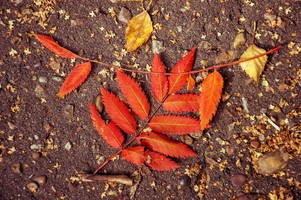Jedenáctý měsíc v roce je, co se týče výkladu jeho pojmenování, asi nejsnáze odhadnutelný.
Jméno měsíce listopadu nepotřebuje žádné speciální vysvětlení: je to doba, kdy poslední listí padá ze stromů. Jaké pranostiky se k tomuto odbobí v češtině pojí?
V listopadu hřmí – sedlák vesnou sní.
Listopadové hřmění pšenici ve zlato mění.
Když ještě v listopadu hřmívá, úrodný rok nato bývá.
Když krtek v listopadu ryje, budou na Vánoce létat komáři.
Stromy-li v listopadu kvetou, sahá zima až k létu.
Padá-li listí v listopadu, jistě brzy přijde led, ale dlouho nepobude.
Když dlouho listí nepadá, tuhá zima se přikrádá.
Když se v listopadu hvězdy třpytí, mrazy se brzo uchytí.
Studený listopad – zelený leden.
Jestliže sníh listopadový dlouho zůstane, více než hnůj polím prospěje.
Když napadá sníh na zelené listí, bude tuhá zima.
V listopadu příliš mnoho sněhu a vody, to známka příští neúrody.
Jaký listopad, takový březen.
A něco málo z anglické poezie na téma listopadového typicky chmurného a chladného počasí…
„Dull November brings the blast,
Then the leaves are whirling fast.“ (Sara Coleridge)
„November comes
And November goes,
With the last red berries
And the first white snows.
With night coming early,
And dawn coming late,
And ice in the bucket
And frost by the gate.
The fires burn
And the kettles sing,
And earth sinks to rest
Until next spring.“ (Elizabeth Coatsworth)
„So dull and dark are the November days.
The lazy mist high up the evening curled,
And now the morn quite hides in smoke and haze;
The place we occupy seems all the world.“
(John Clare, November)
„November always seemed to me the Norway of the year.“
(Emily Dickinson)
„No warmth, no cheerfulness, no healthful ease,
No comfortable feel in any member –
No shade, no shine, no butterflies, no bees,
No fruits, no flowers, no leaves, no birds –
November!“ (Thomas Hood, No!)
„November’s sky is chill and drear,
November’s leaf is red and sear.“
(Sir Walter Scott)





